ACGT Program Trainees
2025-2026 Advocates

Jennifer Blanc, PhD, is a Data Science Preceptor at the University of Chicago Data Science Institute and the City Colleges of Chicago. She earned her PhD in Human Genetics from the University of Chicago in 2024. As a statistical and population geneticist, her research focuses on developing novel approaches that leverage genetic data to better understand complex trait variation across diverse human populations. As an educator, Jennifer is passionate about genetics education and outreach. Her policy interests focus on improving genetics education for both K-12 and adult learners, with the goal of improving public understanding of the complex interplay between genetics and environmental factors in shaping phenotypic variation.

Dallas Hurst is a second-year Master’s candidate in the Human Genetics and Genomic Data Analytics program at the Keck Graduate Institute in Claremont, California. She earned her Bachelor of Science in Biology from the University of La Verne, where she was introduced to the value of effective scientific communication. Her participation on the undergraduate debate team, along with her graduate coursework in genomics, has strengthened her commitment to understanding how policy influences access to innovative care for vulnerable populations. Through the ACGT program, Dallas hopes to refine her ability to advocate for ongoing research and communicate its importance to audiences beyond the scientific community. She aspires to center her career on advancing equity in translational and clinical research by expanding representation and access for underserved populations.

Shaurita D. Hutchins is a Ph.D. candidate in Genetics, Genomics, and Bioinformatics at the University of Alabama at Birmingham. Her research is centered on the application of computational genomics to rare genetic disorders, with an emphasis on integrating multi-omic data to identify underlying disease mechanisms. Her policy interests include advancing inclusivity in genomic research, addressing bias in AI models trained on non-diverse datasets, and strengthening protections for data ownership and consent. She is also interested in privacy considerations and the ethical use of large-scale sequencing data and AI-driven data analysis. Through the ACGT program, she looks forward to expanding her advocacy skills and contributing to policy discussions that promote equity and accountability in genomics.
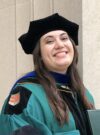
Emilee Kotnik, PhD, is currently a Postdoctoral Research Associate at Washington University in St. Louis (WashU), studying the methylation and genomics of AML and CAR-T cells. She received her PhD in Molecular Genomics and Genetics from WashU in 2023 and studied ovarian cancer genomics for her dissertation research. She attended the University of Michigan for undergrad and grew up in Ohio. Emilee is very passionate about applying her expertise in genetics and genomics to make a broader impact beyond the lab. She is interested in policy and advocacy on novel genetic technologies, genetic privacy, and access to genetic testing for disease prevention.
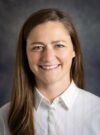
Nicole R. Legro, MD (Nikki), is a fourth-year obstetrics and gynecology resident at MedStar Washington Hospital Center/Georgetown University Hospital. She earned her B.S. in Biochemistry from the University of Toronto and her M.D. from Penn State College of Medicine. Nikki’s interest in genetics began with studying basic pathways in yeast and has evolved to focus on prenatal genetics and genotype–phenotype correlations in rare disorders. She will be pursuing a combined fellowship in Maternal-Fetal Medicine and Clinical Genetics, with long-term goals of integrating prenatal diagnosis, genomic medicine, and multidisciplinary care for families experiencing complex pregnancies. Her advocacy interests include equitable access to reproductive genetic testing and improving patient and provider education on prenatal screening. Through this program, she hopes to expand her understanding of newborn screening.

Taylor Rabanus is a second-year genetic counseling M.S. student at the Medical University of South Carolina. She earned her B.S. in Genomics and Molecular Genetics from Michigan State University. For her collaborative master’s thesis, she is evaluating cancer genetic counselor perceptions and knowledge of preimplantation genetic testing for monogenic disorders (PGT-M). Her policy interests include the recent termination of the Secretary’s Advisory Committee on Heritable Disorders in Newborns and Children (SACHDNC), which guides updates to the Recommended Uniform Screening Panel (RUSP), as well as advocating for increased NIH funding to advance disease research. She looks forward to developing advocacy skills and incorporating them into her career as a clinical genetic counselor to better serve future patients.

Nandini Samanta is a PhD student in Genetics and Genomics at the Icahn School of Medicine at Mount Sinai. She completed her B.S. in Genetics from the University of Rochester, before working as a research assistant at Massachusetts General Hospital. At Mount Sinai, she is using computational approaches to study structural variants in the genome and how they impact health and disease. Broadly, her interests include how policy can promote equitable access to and implementation of genomics research. In particular, she wants to understand how genomic tools can be responsibly integrated into research and clinical practice while addressing disparities in population sampling and representation.
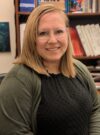
Kate Shelly, PhD, is currently a postdoctoral fellow and genetic counseling trainee in the Department of Human Genetics at Emory University. Kate’s basic research focuses on the molecular mechanisms underlying FMR1-related conditions, while her genetic counseling thesis utilizes large-omics data to identify new comorbidities in women with the FMR1 premutation. These projects build on Kate’s experience in reproductive biology and the clinical IVF laboratory gained prior to graduate school. Her policy and advocacy interests are to expand access to genetic counseling and genetic services for individuals at risk of inherited conditions, particularly those affected by rare diseases or reproductive challenges. Through these efforts, she aims to shorten diagnostic odysseys and provide essential genetics education to the individuals and families who need it most.

Carissa Sherman is a PhD candidate in the Human Medical Genetics and Genomics program at the University of Colorado Anschutz Medical Campus and a member of the Claw Indigenous Genomics and Ethics Laboratory. She earned her B.A. in Molecular Biology with a minor in Anthropology from Colorado College. Carissa’s mom and uncle are blind from a genetic condition, retinitis pigmentosa, and growing up, Carissa had questions about genetic conditions among Indigenous peoples and the lack of clinical research opportunities on the Navajo Nation, which has upheld a moratorium on human genetic research since 2002. That curiosity led her to her current lab, where she uses mixed-methods research and community-based participatory research approaches to understand community perspectives on genetics to potentially support Tribal leaders in shaping a genetics research policy. Carissa is interested in policy and advocacy with Indigenous peoples, especially around Indigenous Data Sovereignty. Through this program, she hopes to explore the possibilities of science policy and advocacy as an avenue to give back to her communities.

Lauren Spor, MPH, is a Human Genetics PhD candidate at the University of Pittsburgh School of Public Health. She earned an MPH in Public Health Genetics from the University of Pittsburgh and a BS in Human Biology and Society from the University of California, Los Angeles (UCLA). Her doctoral research focuses on the genetic epidemiology of type 2 diabetes (T2D) in Samoans, a population which is underrepresented in biomedical research yet disproportionally affected by T2D. She previously interned with the National Cancer Institute to conduct cancer genetic epidemiology research on xeroderma pigmentosum, a rare disease, and volunteered with the All of Us Research Program’s Policy Office to support the ethical, legal, and social implication assessments of their proposed genomic policies. Lauren strongly supports science-based policy. Her advocacy priorities include funding for genomic research, bolstering public health genetics programs like newborn screening, and reproductive rights.
2024 Advocates

Mary Hackbarth, M.S., is a MD-PhD student at the University of Maryland School of Medicine in Baltimore, MD. She is currently a graduate student in the Biochemistry and Molecular Biology program, where she is studying the genetics and molecular mechanisms of syndromic vision and hearing loss. Her prior research experience includes investigating genetic causes and natural history of inborn errors of metabolism from the NIH Undiagnosed Diseases Program translational laboratory. Mary is passionate about rare disease advocacy, both in the realms of improving patients’ access to clinical care and advancing translational research. Through this program, Mary hopes to learn how to advocate for policies that will best serve rare disease patients, from newborn screening programs to regulations surrounding emerging gene and cell therapeutics.

Rodrigo Mendez is a Medical Geneticist from Argentina and currently working as a Postdoctoral Research Fellow at the Stanford Center for Undiagnosed Diseases. Rodrigo completed a residency program in Clinical Genetics at the Centro Nacional de Genética Médica – ANLIS (Buenos Aires, Argentina) and a Master’s program in Medical Molecular Biology at Buenos Aires University. He continued his scientific career at a German genomic start-up, working as a human geneticist and providing his expertise in rare disorders, genomic data (WGS/WES/gene panels) analysis, variant interpretation, and its integration with a deep focus on genotype-phenotype correlation. At Stanford University, Rodrigo is conducting his postdoctoral research studies to discover new gene-disease associations and contribute to understanding the etiology of ultra-rare genetic disorders. In alignment with his professional goals, Rodrigo is committed to advocating in advancing rare disease research, Orphan Drug Development, and improving access to comprehensive healthcare for rare disease patients.

Lydia Rader is a Ph.D. candidate in the Behavioral, Psychiatric, and Statistical Genetics program at University of Colorado Boulder. Lydia received her MSc in Behavioral Genetics from King’s College London. Her current research is focused on elucidating the genetic basis of chronic pain syndromes and their overlaps with substance use disorders, psychopathology, brain structure, and cognition. Her current policy interests are in improving diversity in genetic cohorts and equitable access to advances from genomic research. She also is interested in data diplomacy, sharing, and privacy in genetics.

Kathleen (Kathy) Rosales is a second-year genetic counseling M.S. student at Sarah Lawrence College. She has a B.S. in Human Physiology from Boston University, and M.P.H. in Epidemiology from the City University of New York Graduate School of Public Health and has worked in clinical research at Albert Einstein College of Medicine and most recently, at NYU Perlmutter Cancer Center. For her master’s thesis, she is evaluating the performance of NLP systems in extracting phenotype terms from medical chart notes to potentially be used in a genomic tool to enhance clinicians’ searches for their patients’ diagnoses. Her particular policy interests are in enhancing genetics education, informed consent in genetic research, and increasing diversity in the genetics workforce as well as in genetic research participants. She is looking forward to learning and incorporating advocacy skills in a career as a clinical or research genetic counselor to ultimately benefit future patients in her care.

Miriam Saffern is a Ph.D. student in immunology at the Icahn School of Medicine at Mount Sinai. Originally from New Jersey, she made the short trek to New York City to pursue a BA in biochemistry from Stern College for Women and a BS in biomedical engineering from Columbia University. At Mount Sinai, she uses both computational and experimental approaches to study cancer risk in the context of the immune system. Her career goals are to work as a computational immunologist aimed at preventing cancer and to communicate science to a variety of audiences. Her policy interests lie in advocating for increased funding for cancer genetics and prevention research and investing in building diverse biobanks. She is honored and excited to be a part of the ACGT program.
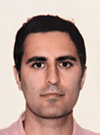
Morteza Seifi is a Laboratory Genetics and Genomics (LGG) fellow at UW-Madison and holds a Ph.D. in Medical Genetics from the University of Alberta. Previously a post-doctoral fellow at Alberta Children’s Hospital, he contributed significantly to the Care for Rare Solve program. Morteza specializes in integrating molecular and cytogenetic diagnostic approaches to advance personalized healthcare for patients with genetic disorders. His research accomplishments include over 50 published papers, more than 25 national and international conference presentations, and contributions to 5 books and book chapters. Recognition of his contributions includes numerous competitive awards (>$800K), including Canada’s largest and most prestigious endowment for academic activities, the “Izaak Walton Killam Memorial Scholarship.” Morteza has honed leadership, administrative, supervisory, and teaching abilities through participation in various committees and expert panels at professional societies like ACMG and ASHG. As Vice President of Student Affairs (VPSA) and a member of the Board of Directors, he works to foster an environment conducive to growth and success in the field of human genetics and genomics.

Larah Siouffey is a current Master’s student studying Human Genetics and Genomic Data Analytics at Keck Graduate Institute. She received her B.S. in Molecular Biology at University of California, Santa Cruz where her passion for genetics grew and led to her master’s. Inspired by her experiences at a National Organization of Rare Diseases (NORD) conference, where she interacted with policymakers and rare disease patients, Larah is driven to advocate for increased NIH funding to support research, especially in rare diseases. In her capstone project with Ambry Genetics, where she examines the impact of genetic ancestry on predictive models for breast cancer, Larah underscores the critical importance of inclusivity in genomic studies. Her interests in genomic research are one that reflects the rich diversity of the global population, ensuring that healthcare interventions are effective across diverse communities.

Guinevere Spurdens, currently in her third year as a Ph.D. candidate at the University of Miami Miller School of Medicine, is working towards her doctorate in Human Genetics and Genomics. Within the Hussman Institute for Human Genomics, she dedicates her research to the development of groundbreaking gene therapies for rare inherited disorders, with a specific focus on addressing cerebellar ataxias. Beyond her lab work, Guinevere is deeply committed to advancing advocacy for individuals living with rare diseases. Her goal is to become a strong advocate, ensuring that those facing these disorders don’t lose hope in the pursuit of furthering research and treatments. In her advocacy role, Guinevere hopes to connect with patient communities, raise awareness about various rare diseases, and actively contribute to initiatives that improve the unique challenges that these patients live with. By joining collective efforts, she aspires to contribute to positive change in the realm of rare disease research, treatment, and support.

Jennifer (JJ) Waldo is a PhD candidate in the Integrative Genetics and Genomics graduate group at the University of California, Davis. She received her B.S. in Cellular & Molecular Biology from CSU Northridge and her M.A. in Stem Cell Biology from CSU Sacramento. Her research focuses on using CRISPR-dCas9 to develop treatments for Huntington’s Disease. Her interests in policy and advocacy originate from her time working within the rare disease community and gaining a deep understanding of the need for governmental intervention to help those with rare disorders. She is also interested in the regulation and approval of gene editing technology as it rapidly moves to the clinic.

Diya Yang is a Ph.D. candidate in Biomedical and Health Informatics at Case Western Reserve University School of Medicine’s Department of Population and Quantitative Health Sciences. She also works as a visiting researcher at the Lerner Research Institute of Cleveland Clinic. Her research explores the impact of kidney function on Alzheimer’s disease and related dementias, with a focus on the disproportionate burden these conditions have on minority populations. Diya is passionate about diversifying multi-omic and clinical databases, enhancing representation in biomedical research, and ensuring health equity in access to screening, prevention, and treatment. Her policy interests center on responsible data sharing, patient privacy, and preventing genetic discrimination. Through her advocacy efforts, Diya aims to bridge connections between renal and neural health and improve outcomes for marginalized communities.
2023 Advocates

Anna Capria is a current Human Genetics and Genomic Data Analytics MS student at Keck Graduate Institute. She is an alumnus of the Rochester Institute of Technology with a Bachelor’s in Biomedical Science. Finishing up her capstone project at KGI with Boston Children’s Hospital, she analyzes phenotypic information from the Children’s Rare Disease Cohorts initiative. Driven by making sense of data, this project and training allow Anna to pull meaningful insights. In her free time, she is active in campus life, including serving as the professional development chair in student government and running the data science club. Anna has always been interested in human genetics and rare disease, which is why she actively participates in her Students for Rare NORD chapter. Anna is driven by improving the people around her, which further motivates her excitement for this program. In the future, Anna hopes to be a leader in advocating and understanding the ethical issues surrounding genetics so that all people have informed access to their genetic information.

Hubert Chen is a current undergraduate student at Vanderbilt University working towards completing majors in Medicine, Health and Society, and Computer Science. He has several research interests and, in the past, has done research on Duchenne Muscular Dystrophy (DMD), a genetic muscle-wasting disease, to identify the types of mutations that would frequently cause it to occur and the relationship between DMD and cancer. He has also done research on the PD-1/PD-L1 protein pathway to try and identify several small molecules that could interfere in this pathway that cancer cells take advantage of to avoid the immune system. In the future, he would like to continue extending his work on these two research topics. He also has deep interests in advocating for genetics given his research experience and is most interested in increasing the amount of genetic testing for cancer patients and newborns and improving access to equal quality genetic care for all. He feels privileged to be a part of this program, especially as an undergraduate and hopes to learn a lot from the experienced people in it.

Richard Coca is a Master’s student at the Stanford School of Medicine, which he began after completing a B.S. in Human Biology at Stanford. At Stanford, Richard is affiliated with the Center for Undiagnosed Disease and Stanford’s Genomics Research to Elucidate the Genetics of Rare disease (GREGoR) site. Regarding policy and advocacy, Richard is interested in the increased funding for rare diseases, regulation of genetic data, and frameworks around health equity.

Ricardo Harripaul, Ph.D., has been a postdoctoral fellow at Massachusetts General Hospital, The Broad Institute of MIT and Harvard and Harvard Medical School since 2021. He received his Ph.D. from the University of Toronto in 2021, where he identified rare recessive variants associated with autism spectrum disorder and Intellectual Disability. Now he is combining his rare variants analysis with functional genomics to determine the consequences of mutations and how they relate to phenotypes to help improve therapies. He uses a combination of CRISPR modified cell lines and functional animal models. The lack of diverse models to study impedes the translation of research findings to clinic. Ricardo’s interest in policy and advocacy stems from the disparity in genomic research not only in the samples used but also the accessibility to different groups. It is important that funding agencies increase diversity in research and make the findings more relevant to marginalized populations to improve health and give the fruits of scientific research to everyone domestically and abroad.

Christy LaFlamme (she/her), M.S., is a third-year Ph.D. candidate at the St. Jude Children’s Research Hospital Graduate School of Biomedical Sciences in Memphis, TN. Her current research focuses on the neurogenetics and epigenetics of severe pediatric neurological disorders. Christy recognizes how marginalized communities are underrepresented in genomics research while simultaneously being impacted by the translation of genetic information into society. Her interests in policy and advocacy are driven by her desire to influence policies that address systemic inequities in genomics research. These include advocating for increased funding to support diversity and representation in biomedicine, supporting gender-affirming genetics care, and petitioning against the misuse of genetic information.

Jasmine Lewis is a third year Ph.D. student in the Biological Psychology program at Virginia Polytechnic Institute and State University. Before graduate school, she was an advocate for survivors of domestic and sexual violence. One of her long-term career goals is to: 1) develop and refine community-based interventions; and 2) educate the community on possible protective factors that could help offset the negative effects of chronic traumatic stress. In order to achieve this long-term goal, her program of research focuses on the biological and psychological sequelae of childhood trauma. Her current policy interest is improving equitable access to genomic research for underserved communities especially those that have experienced trauma.

Nandana Rao, Ph.D., M.S., is an ORISE postdoctoral fellow at the Centers for Disease Control and Prevention Office of Genomics and Precision Public Health. Nandana received an M.S. in genetic epidemiology and a Ph.D. in public health genetics from the University of Washington, Seattle. Her dissertation focused on implementation and health equity considerations for population genetic screening of adults for hereditary cancers and heart disease. Nandana’s policy and advocacy interests center around improving equitable access to genetic services for all individuals.

Grace Tietz is a Ph.D. student in the Genetics & Genomics Program at Baylor College of Medicine. Prior to starting her graduate studies, she worked at the National Institute of Allergy and Infectious Diseases where she facilitated data sharing activities in the context of the COVID-19 pandemic and obtained her B.S. at the University of Maryland College Park. Her current research aims to improve transferability of genetic testing across ancestries using population genetics approaches. Her policy interests are centered around the importance of improving diversity in genetics, both in the workforce, and in the cohorts that are studied. She additionally has interests in data diplomacy, sharing, and governance in genetics.

Leonard Wang is an M.D./M.P.H. student at the University of Texas Medical Branch. He received his B.S. in Biomedical Sciences from the University of Houston, where he conducted environmental conservation research in the Galápagos Islands. At the University of Texas Medical Branch, Leonard works as the Health Policy Research Coordinator for the Center for Violence Prevention. He is also a Senior Fellow for the Albert Schweitzer Fellowship, where he founded a vaping harm reduction program to educate middle and high school students on the science of addiction and the health impacts of vaping. Leonard is passionate about using narrative medicine and a structural violence lens to promote health equity and advocate for patients. His overarching goal is to improve equitable access to genetic care and develop human-centered solutions for sustainable change in our healthcare system.
2022 Advocates

Yusra Aziz is a current genetic counseling student at the University of Texas MD Anderson Graduate School. She has a B.S. in Genetics from Texas A&M University, and worked as a student assistant in the Office for Diversity and volunteered for the Crisis Helpline. She sees being an advocate for marginalized patient communities as a responsibility and is passionate about increasing equity in genetic testing access and genomic research. Her current research is exploring the need for racial and ethnic health disparity curriculum in genetic counseling programs.

Rene Begay, M.S., is (Diné/Navajo) from Arizona. She is an Indigenous geneticist and public health researcher. She obtained her B.S. in Biology from the University of Arizona and a Master’s in Clinical Science from the University of Colorado Anschutz Medical Campus. Currently, she works as a Professional Research Assistant at the Centers for American Indian and Alaska Native Health at the University of Colorado School of Public Health while studying as an online Master’s of Public Health and Bloomberg Scholar with the Johns Hopkins School of Public Health, focusing on the topic of food systems and obesity. Her advocacy interests include ensuring that Indigenous people’s voices are involved in genomics research studies at the local to national level. Furthermore, Indigenous communities are equitably engaged, consulted, and ultimately leaders in genomic studies that seek to benefit their people. Her current policy interest is to help the Navajo Nation develop a genetics research policy that will enable her community to participate or not participate in genomics research in the future.

Grace Calfee is a second-year health sciences and nonprofit administration student at Cleveland State University who would like to become a genetic counselor. In the future, she would like to work on research for genetic counseling or genetic risk factors for cancers without known causes. She enjoys advocating for people with disabilities and working with them, and hopes to continue to do so in the future. Preventing genetic discrimination and regulating direct-to-consumer genetic testing are her other advocacy goals. She feels privileged to be a part of the ACGT program, especially as the only undergraduate student.
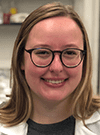
Christina Del Greco is a Ph.D. candidate at the University of Michigan Department of Human Genetics, which she began after completing a B.S. in Biological Sciences from the University of Notre Dame. At the University of Michigan, Christina studies the proteins (called aminoacyl-tRNA synthetases, or ARSs) that are responsible for preparing amino acids for cells to make new proteins. Specifically, Christina studies the role of ARSs in the mitochondria. If mutations occur that cause these ARSs to lose their function, then the mitochondria are unable to make the proteins required for generating energy for cells, which can lead to disease. Regarding policy and advocacy, Christina is interested in the regulation of genetic data, specifically but not limited to direct-to-consumer genetic testing, as well as germline gene editing policies.

Kimberlyn Ellis is a Ph.D. student in the Training Program in Human Genetics at Vanderbilt University Medical Center. Her research explores the interplay of genetic determinants, behavioral determinants, and social determinants of health with an emphasis on health equity. With this work, Kimberlyn hopes to elucidate the ways in which social and environmental factors “get under the skin” and influence disease onset and outcomes in marginalized communities. Prior to being a Ph.D. student, she received a B.S. in Biology from Spelman College in 2019 and completed the NIH Postbaccalaureate Research Education Program at Brown University in 2020. In 2022, Kimberlyn became a Christine Mirzayan Science and Technology Policy Fellow at The National Academies of Sciences, Medicine, and Engineering. Kimberlyn’s policy and advocacy interests include improving social determinants of health for underserved communities, reducing health disparities, increasing funding for interdisciplinary research between basic science and social science fields, and promoting social good.

Azra Frkatovic is an early-stage researcher at Genos, a company which specializes in high-throughput glycome analysis, while also pursuing a Ph.D. at the University of Zagreb, Croatia. Her Ph.D. project is focused on investigating the genes involved in antibody glycosylation, a process which is highly important for the regulation of our immune system. Having the experience of working in the field of genomics, Azra decided to join the ACGT program to learn how to address the lack of support for genomic research and genetic data protection back in her home country. She also sees the ACGT program as a great opportunity to gain skills and get familiar with the ways to bridge the gap between scientific discovery and the policy-making process.

Sofia Horan is a second-year genetic counseling student at Sarah Lawrence College. She received a B.S. in Cell and Molecular Biology from Northeastern University in 2020. For her master’s thesis she researched the impact restrictive abortion legislation has on genetic counseling practice. She has particular interests in how genetics policies directly affect patient care, like the Genetic Information Nondiscrimination Act (GINA) protections and newborn screening policies, and how to utilize genetics policies to expand access to genetic testing.

Kristen Lancaster, M.D., is currently a clinical fellow in Medical Genetics and Genomics at the University of North Carolina at Chapel Hill. She received a B.A. in Biology and Music Performance from Franklin and Marshall College and an M.D. from the University of Maryland School of Medicine. She is a board-certified pediatrician after completing a residency and chief residency in pediatrics at the University of Texas Southwestern from 2017 to 2021. Kristen currently serves as the Section on Pediatric Trainees Liaison to the American Academy of Pediatrics Council on Genetics. As a fellow, her clinical research focuses on the natural medical history and quality of life of children with STAC3 disorder (also known as Native American Myopathy), which is a rare genetic disease characterized by life-long musculoskeletal weakness. In addition to practicing clinical genetics, Kristen has early career interests in medical education and advocacy, specifically related to improving equitable access to genetics care for all individuals.

John Morris, Ph.D., has been a Postdoctoral Fellow at the New York Genome Center and New York University since 2019. He received his Ph.D. in Human Genetics from McGill University in 2018, where he identified novel genetic determinants of aging-related diseases, such as osteoporosis, using population-scale genetic data. Now, he is combining cutting-edge CRISPR genome engineering methods and single-cell sequencing to further understand the genetic determinants of common diseases, through identifying their causal genes and gene networks. One great thing about these experimental methods is that they are population and disease agnostic, meaning researchers can apply them to study data generated from any population to identify novel disease genes and networks. Agnostic tools are especially important given the lack of genetic data generated from diverse populations, as it is well-known that almost 90% of genetic data comes from individuals with European ancestries. John’s interest in policy and advocacy stems from this disparity in genomics research, and how funding agencies like the NIH should support programs that increase diversity in genomic studies domestically and abroad.

Kenny Westerman, Ph.D., is a research fellow at Massachusetts General Hospital and Harvard Medical School with a research interest in precision nutrition for the prevention of metabolic diseases such as diabetes. Kenny received his Ph.D. in Biochemical and Molecular Nutrition from Tufts University, with a dissertation focused on predicting cardiovascular disease risk by integrating molecular quantities and dietary data. His current work uses tools from data science and genetics to understand why people respond differently to changes in diet and other lifestyle factors. In the policy space, he is interested in the regulation of direct-to-consumer genetic tests that use this type of research to develop personalized lifestyle recommendations.
